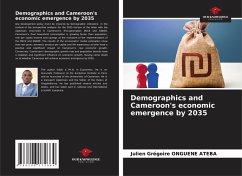Any development policy must be inspired by demographic indicators. In the context of the prospective analysis for the 2035 horizon of the latter with the objectives enshrined in Cameroon's first-generation DSCE and SND30, Cameroon's final household consumption is growing faster than population, real per capita income and savings at the mid-point of the implementation of the DSCE and SND30. The results of the econometric model estimation show that real gross domestic product per capita and life expectancy at birth have a positive and significant impact on Cameroon's real economic growth. Conversely, Cameroon's demographic growth rate and population density have a negative and significant influence on economic growth, leaving some doubt as to whether Cameroon will achieve economic emergence by 2035.
Bitte wählen Sie Ihr Anliegen aus.
Rechnungen
Retourenschein anfordern
Bestellstatus
Storno

